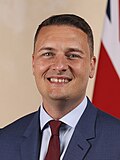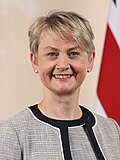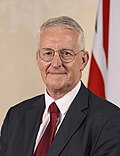| Ministerial department | Minister responsible | Civil servant responsible | |
|---|
| Attorney General's Office |  | Richard Hermer, Baron Hermer
Attorney General | Douglas Wilson
Director-General | [3] [4] |
| Cabinet Office |  | Darren Jones
Chief Secretary to the Prime Minister,
Minister for Intergovernmental Relations,
Chancellor of the Duchy of Lancaster | Sir Chris Wormald
Cabinet Secretary and Head of the Civil Service Catherine Little
Permanent Secretary | [5] |
| Department for Business and Trade |  | Peter Kyle
Secretary of State for Business and Trade,
President of the Board of Trade | Gareth Davies
Permanent Secretary | [6] |
| Department for Culture, Media and Sport |  | Lisa Nandy
Secretary of State for Culture, Media and Sport | Susannah Storey
Permanent Secretary | [7] [8] |
| Department for Education |  | Bridget Phillipson
Secretary of State for Education,
Minister for Women and Equalities | Susan Acland-Hood
Permanent Secretary | [9] [10] |
| Department for Energy Security and Net Zero |  | Ed Miliband
Secretary of State for Energy Security and Net Zero | Clive Maxwell
Interim Permanent Secretary |
| Department for Environment, Food and Rural Affairs |  | Emma Reynolds
Secretary of State for Environment, Food and Rural Affairs | Paul Kissack
Permanent Secretary | [11] [12] |
| Department for Science, Innovation and Technology |  | Liz Kendall
Secretary of State for Science, Innovation and Technology | Emran Mian
Permanent Secretary |
| Department for Transport |  | Heidi Alexander
Secretary of State for Transport | Jo Shanmugalingam
Permanent Secretary | [13] [14] |
| Department for Work and Pensions |  | Pat McFadden
Secretary of State for Work and Pensions | Sir Peter Schofield
Permanent Secretary | [15] [16] |
| Department of Health and Social Care |  | Wes Streeting
Secretary of State for Health and Social Care | Samantha Jones
Permanent Secretary | [17] [18] |
Export Credits Guarantee Department
(trading as UK Export Finance) |  | Peter Kyle
President of the Board of Trade | Tim Reid
Chief Executive | [19] [20] |
|
| Foreign, Commonwealth and Development Office |  | Yvette Cooper
Secretary of State for Foreign, Commonwealth and Development Affairs | Sir Olly Robbins
Permanent Secretary | [21] [22] |
| HM Treasury |  | Rachel Reeves
Chancellor of the Exchequer | James Bowler
Permanent Secretary | [23] [24] |
| Home Office |  | Shabana Mahmood
Secretary of State for the Home Department | Dame Antonia Romeo
Permanent Secretary | [25] [26] |
| Ministry of Defence |  | John Healey
Secretary of State for Defence | Jeremy Pocklington
Permanent Secretary | [27] |
| Ministry of Housing, Communities and Local Government |  | Steve Reed
Secretary of State for Housing, Communities and Local Government | Dame Sarah Healey
Permanent Secretary | [28] [29] |
| Ministry of Justice |  | David Lammy
Deputy Prime Minister,
Lord Chancellor and Secretary of State for Justice [30] [31]
| Jo Farrar
Permanent Secretary and Clerk of the Crown in Chancery | [32] |
| Northern Ireland Office |  | Hilary Benn
Secretary of State for Northern Ireland | Julie Harrison
Permanent Secretary | [33] |
| Office of the Advocate General for Scotland |  | Catherine Smith, Baroness Smith of Cluny [34] [35]
Advocate General for Scotland | Neil Taylor
Director and Solicitor to the Advocate General [36] | [37] |
| Office of the Leader of the House of Commons [n 1] |  | Sir Alan Campbell [38] [39]
Lord President of the Council,
Leader of the House of Commons | N/A | [40] |
| Office of the Leader of the House of Lords [n 1] |  | Angela Smith, Baroness Smith of Basildon [38] [41]
Lord Privy Seal,
Leader of the House of Lords | N/A | [42] |
| Scotland Office |  | Douglas Alexander [34] [43]
Secretary of State for Scotland | Laurence Rockey
Director | [44] [45] |
| Wales Office |  | Jo Stevens
Secretary of State for Wales | Glynne Jones
Director [46] | [47] |
|

























